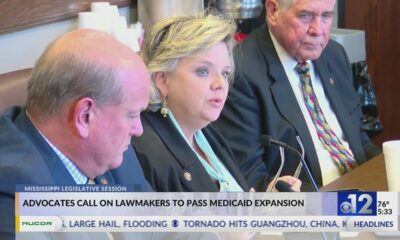Mississippi Today
Gov. Tate Reeves’ negatives are sky high. His strategy is to make Presley’s higher.

Gov. Tate Reeves' negatives are sky high. His strategy is to make Presley's higher.
The story goes something like this.
Two guys on a hike see an angry bear and turn tail to run in the opposite direction. One guy proclaims helplessly, “We can't outrun a bear,” to which the other replies, “I don't have to outrun the bear, I just have to outrun you.”
Republican incumbent Gov. Tate Reeves hopes to make the 2023 general election, where he is likely to face Democrat Brandon Presley, like that hike in the woods.
Reeves hopes to make the race one where he does not have to convince the electorate to like him — he just has to convince voters to dislike him less than they dislike Presley.
No matter how often Reeves and his supporters want to shout “fake news” or “rigged polling,” the evidence is clear that the incumbent governor is not well-liked by Mississippi voters.
A recent Tulchin Research poll revealed that 54% of respondents had an unfavorable view of Reeves compared to 42% who viewed the incumbent governor favorably.
His favorability was even lower when respondents were quizzed about Reeves' role in the ongoing scandal where at least $77 million in welfare funds were misspent, resulting in criminal convictions for some state officials, including people close to Reeves.
Perhaps more telling is a Siena College poll commissioned last month by Mississippi Today that found that 56% of poll participants would support “someone else” for governor this year, while 31% would support Reeves.
Recurring polls conducted by Morning Consult find that Reeves, since he's been elected, is among the nation's most disliked governors.
In the Tulchin poll, Presley surprisingly led Reeves 47% to 43%, while the incumbent led 43% to 38% in the Siena poll. At the very least, it appears right now the election will be close — surprisingly close for a Republican incumbent in Republican ruby red Mississippi.
These pollsters are not out to get Reeves. They are all legitimate national pollsters. Siena has been viewed as one of the most respected pollsters in the nation and was deemed as the most accurate in the 2022 midterm elections by the FiveThirtyEight blog, which compiles and analyzes polling data.
In the 2019 election, Reeves even seemed to acknowledge that a lot of folks did not like him, conceding that his willingness to say no to requests for state funding have made many people mad, especially as lieutenant governor where he presided over the Senate. Others say the fact that he is always in attack mode — often taking shots at political opponents when cooperation and humility could be a more appropriate response — turns off some voters.
The same Tulchin Research poll found that 39% had a favorable view of Presley while 18% viewed him unfavorable. The key is that most Mississippians do not know Presley, who has served as Northern District Public Service Commissioner since 2008. Reeves, on the other hand, is about as known a commodity as there is in Mississippi. He has run and won five statewide elections and is completing his 20th year in statewide elected office.
Reeves will strive to ensure that by the time he completes his sixth statewide campaign that Mississippi voters view Presley more negatively than they view him.
Reeves certainly the money to create any negative narrative he wants. According to the January filings with the Secretary of State's office, Reeves has about $8 million cash on hand. He raised $3.5 million during 2022.
That is a lot of money to create a narrative about an opponent.
Presley has just $723,800 cash on hand, including $365,000 raised during 2022.
Reeves' huge cash advantage is one of the primary reasons he is viewed as the heavy favorite despite what polls might say right now. And the last quarter of a century, Mississippians' default vote seems to always be Republican.
Presley will work to introduce himself to the state's electorate as a conservative Democrat who is focused on improving health care, the economy and other state issues. Reeves will focus a lot more on social issues like abortion and immigration. He will publicly question whether Presley is more focused on LBGTQ issues, on open borders, on tearing down white Mississippians while trying to uplift African Americans, and on trying to close all police departments across the state.
But the real question of the 2023 campaign is whether the unfavorability bear will catch Presley or Reeves first.
This article first appeared on Mississippi Today and is republished here under a Creative Commons license.
Did you miss our previous article…
https://www.biloxinewsevents.com/?p=209250
Mississippi Today
On this day in 1951


April 28, 1951

Ruby Hurley opened the first permanent office of the NAACP in the South.
Her introduction to civil rights activism began when she helped organize Marian Anderson's 1939 concert at the Lincoln Memorial. Four years later, she became national youth secretary for the NAACP. In 1951, she opened the organization's office in Birmingham to grow memberships in Alabama, Florida, Georgia, Mississippi and Tennessee.
When she arrived in Mississippi, there were only 800 NAACP members. After the governor made remarks she disagreed with, she wrote a letter to the editor that was published in a Mississippi newspaper. After that step in courage, membership grew to 4,000.
“They were surprised and glad to find someone to challenge the governor,” she told the Chicago Defender. “No Negro had ever challenged the governor before.”
She helped Medgar Evers investigate the 1955 murder of Emmett Till and other violence against Black Americans. Despite threats, she pushed on.
“When you're in the middle of these situations, there's no room for fear,” she said. “If you have fear in your heart or mind, you can't do a good job.”
After an all-white jury acquitted Till's killers, she appeared on the front cover of Jet magazine with the headline, “Most Militant Negro Woman in the South.”
Months later, she helped Autherine Lucy become the first Black student at the University of Alabama.
For her work, she received many threats, including a bombing attempt on her home. She opened an NAACP office in Atlanta, where she served as a mentor for civil rights leader Vernon Jordan, with whom she worked extensively and who went on to serve as an adviser to President Bill Clinton.
After learning of Evers' assassination in 1963, she became overwhelmed with sorrow. “I cried for three hours,” she said. “I shall always remember that pool of blood in which he lay and that spattered blood over the car where he tried to drag himself into the house.”
She died two years after retiring from the NAACP in 1978, and the U.S. Post Office recognized her work in the Civil Rights Pioneers stamp series. In 2022, she was portrayed in the ABC miniseries, “Women of the Movement.”
This article first appeared on Mississippi Today and is republished here under a Creative Commons license.
Mississippi Today
Rare open negotiations occur on important Medicaid expansion issue
The curtain was pulled back last week for the first time in years on the Mississippi Legislature's often mysterious conferencing process.
A conference committee consists of three representatives and three senators appointed to try to reach agreement when the two chambers pass differing versions of the same bill. Last week, a conference committee formed to try to reach agreement on Medicaid expansion caused a stir by meeting in a public setting.
Even though the joint rules of the Mississippi Legislature call for an open conferencing process, the conferees seldom meet in public. They usually meet and negotiate their differences near the end of the session behind closed doors.
That was not always the case.
For a period in the late 1990s and early 2000s, the Legislature, under intense pressure from the Mississippi Press Association, made open conference committees the norm.
Some major issues have been played out in public conference committees. Notable open conferences include:
- The infamous, excruciatingly long special session in 2002 where businesses received more protection from lawsuits.
- Budget fights when Haley Barbour was governor when legislators often would reach an impasse in the negotiations process and spend the bulk of their time talking about their cars and eating candy.
- The major rewrite of the state's economic development package under then-Gov. Ronnie Musgrove called Advantage Mississippi.
- The Mississippi Adequate Education Program, which for decades has provided the state's share for the basic operation of local school districts. It was hammered out in an open conference process in 1997 even before the joint rules mandated the open process.
Then-state Sen. Musgrove and former House Speaker Billy McCoy deserve credit or blame, according to one's perspective, for proving the open conference process could work. When they chaired their respective chamber's education committees, they insisted on having an open conference process.
But in more recent years, open conference committees have been few and far between. The joint rule has been largely ignored.
The fact that the three House and three Senate conferees agreed to meet at least once in public on Medicaid expansion — one of the most pivotal issues facing the Legislature in recent years — drew considerable attention.
If nothing else, the open conference committee provided a raw and unedited view of how far apart the two chambers were at the time on an issue that would provide additional health care coverage to primarily the working poor.
The House wanted to provide coverage to those earning up to 138% of the federal poverty level, or about $20,000 annually for an individual, while the Senate had proposed providing coverage to those earning less than 100% of the federal poverty level, or about $15,000 per year.
According to various experts, the House plan would provide coverage to many more working Mississippians and cost less to the state than would the Senate plan. The reason for the lower cost to the state is that when expanding to 138%, the federal government will pay 90% of the costs and provide the state an additional roughly $700 million over two years as an enticement to expand.
Under the Senate plan, the federal government will pay 77% of the cost and offer no incentives. It is important to understand that in the expensive world of health care, the difference in 77% of the cost and 90% means tens of millions to Mississippi state coffers.
The House conferees repeatedly pointed out those numbers — their plan covering more at less cost — during last week's open conference committee.
One of the reasons legislators through the years have not been enamored with an open conference process is that it has often turned into efforts by the negotiators to sell their position to the public.
Once the open conference process starts, the side that feels the most comfortable with its position wants to meet more often in full view of the public to make sure the public understands where each side stands.
For whatever it is worth, the House conferees were more enthusiastic about continuing the open process after the initial Medicaid expansion conference committee.
And after that initial open conference, the Senate offered a compromise to cover those earning up to 138% of the federal poverty level — just as the House proposed.
This article first appeared on Mississippi Today and is republished here under a Creative Commons license.
Mississippi Today
Legislation to strip key power of PERS Board passes both chambers
Legislation that strips significant power from the board that governs the state's public employee pension program has passed both chambers of the Legislature.
Under the legislation set to go to Gov. Tate Reeves during the final days of the 2024 session, the Public Employees Retirement System Board would no longer have the authority to increase the contribution rate levied on governments (both on the state and local level) to help pay for the massive retirement system.
The legislation, which passed both chambers in recent days, was a reaction to the decision by the board to increase by 5% over a three-year period the amount local governments contribute to each employee's paycheck for their retirement. Under the PERS Board plan, the employer contribution rate would have been increased to 22.4% over three years, starting with a 2% increase on July 1.
The board said the increase was needed to ensure the long-term financial stability of the system that pays retirement benefits for most public employees on the state and local levels, including staff of local school districts and universities and community colleges.
City and county government officials in particular argued that the 5% increase would force them to cut government services and lay off employees.
Under the bill passed by the Legislature there still would be a 2.5% increase over five years — a .5% increase in the employer contribution rate each year for five years.
In addition, legislative leaders said they plan to put another $100 million or more in state tax dollars into the retirement system in the coming days during the appropriations process.
Under current law, the PERS Board can act unilaterally to increase the amount of money governmental entities must contribute to the system. But under the new bill that passed both chambers, the board can only make a recommendation to the Legislature on increasing the employer contribution rate.
The PERS Board also would be required to include an analysis by its actuary and independent actuaries on the reason the increase was needed and the impact the increase would have on governmental entities.
In the 52-member Senate, 14 Democrats voted against the bill. Only one House member voted against the proposal.
Sen. David Blount, D-Jackson, said the bill failed to address the financial issues facing the system. He said a permanent funding stream is needed.
Blount said, “You are moving in the wrong direction and weakening the system” with the bill the Legislature approved. “Is it painful? Is it going to cost more money? Yes, but we need to do it” to fix the system.
The system has assets of about $32 billion, but debt of about $25 billion. But Sen. Daniel Sparks, R-Belmont, and others argued that the debt was “a snapshot” that could be reduced by strong performance from the stock market. The system depends on its investments and contributions from employers and employees as sources of revenue.
The system has about 360,000 members including current public employees and former employees and retirees.
The legislation states that no changes would be made for current members of the system. The legislation does reference looking at possibly changing the system for new employees. But that would be debated in future legislative sessions.
The bill does not include an earlier House proposal to dissolve the PERS Board, which consists primarily of people elected by the members of the system, and replace them with political appointees.
This article first appeared on Mississippi Today and is republished here under a Creative Commons license.
-
Local News3 days ago
Sister of Mississippi man who died after police pulled him from car rejects lawsuit settlement
-
Mississippi Today3 days ago
At Lake High School in Scott County, the Un-Team will never be forgotten
-
Mississippi News1 day ago
One injured in Mississippi officer-involved shooting after chase
-
Mississippi News6 days ago
Cicadas expected to takeover north Mississippi counties soon
-
Mississippi Today13 hours ago
On this day in 1951
-
Mississippi News5 days ago
Viewers make allegations against Hatley teacher, school district releases statement – Home – WCBI TV
-
Mississippi News Video4 days ago
Vehicle struck and killed man lying in the road, Alcorn County sheriff says
-
Mississippi Today7 days ago
On this day in 1892



































